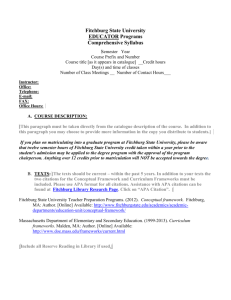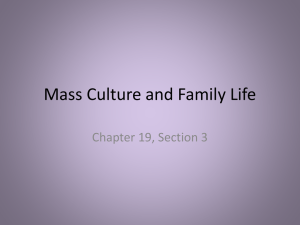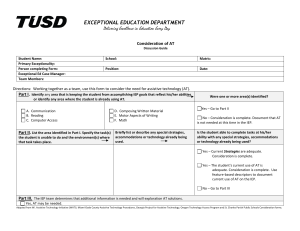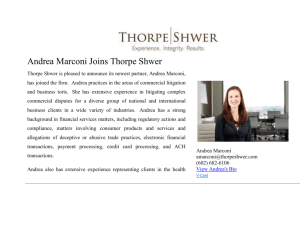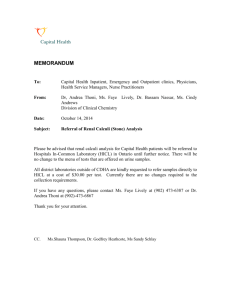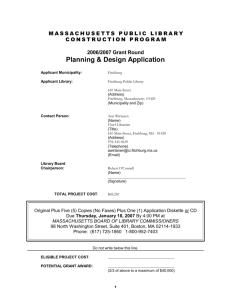Ext Campus: Education Syllabus Template
advertisement
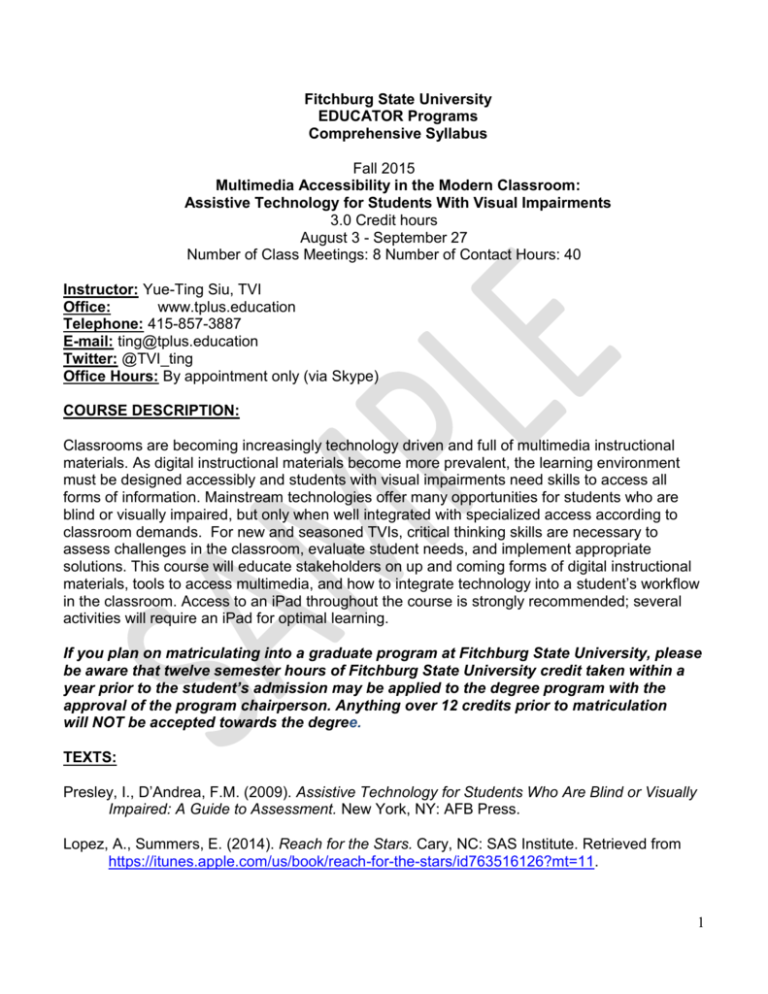
Fitchburg State University EDUCATOR Programs Comprehensive Syllabus Fall 2015 Multimedia Accessibility in the Modern Classroom: Assistive Technology for Students With Visual Impairments 3.0 Credit hours August 3 - September 27 Number of Class Meetings: 8 Number of Contact Hours: 40 Instructor: Yue-Ting Siu, TVI Office: www.tplus.education Telephone: 415-857-3887 E-mail: ting@tplus.education Twitter: @TVI_ting Office Hours: By appointment only (via Skype) COURSE DESCRIPTION: Classrooms are becoming increasingly technology driven and full of multimedia instructional materials. As digital instructional materials become more prevalent, the learning environment must be designed accessibly and students with visual impairments need skills to access all forms of information. Mainstream technologies offer many opportunities for students who are blind or visually impaired, but only when well integrated with specialized access according to classroom demands. For new and seasoned TVIs, critical thinking skills are necessary to assess challenges in the classroom, evaluate student needs, and implement appropriate solutions. This course will educate stakeholders on up and coming forms of digital instructional materials, tools to access multimedia, and how to integrate technology into a student’s workflow in the classroom. Access to an iPad throughout the course is strongly recommended; several activities will require an iPad for optimal learning. If you plan on matriculating into a graduate program at Fitchburg State University, please be aware that twelve semester hours of Fitchburg State University credit taken within a year prior to the student’s admission may be applied to the degree program with the approval of the program chairperson. Anything over 12 credits prior to matriculation will NOT be accepted towards the degree. TEXTS: Presley, I., D’Andrea, F.M. (2009). Assistive Technology for Students Who Are Blind or Visually Impaired: A Guide to Assessment. New York, NY: AFB Press. Lopez, A., Summers, E. (2014). Reach for the Stars. Cary, NC: SAS Institute. Retrieved from https://itunes.apple.com/us/book/reach-for-the-stars/id763516126?mt=11. 1 Fitchburg State University Teacher Preparation Programs. (2012). Conceptual framework. Fitchburg, MA: Author. [Online] Available: http://www.fitchburgstate.edu/offices/academic-offices/education-unit/conceptualframework/ Massachusetts Department of Elementary and Secondary Education. (1999-2011). Curriculum frameworks. Malden, MA: Author. [Online] Available: http://www.doe.mass.edu/frameworks/current.html Optional: Perez, L. (2015). Supporting Students with Low Vision Using Apple Technology. St. Petersburg, FL: Luis Perez. Retrieved from https://itunes.apple.com/us/book/supporting-students-lowvision/id998667650?mt=11 Fitchburg State University Teacher Education Conceptual Framework Knowledgeable Caring Ethical Skillful LEARNING OUTCOMES / OBJECTIVES: Participants will learn: How to use mainstream and specialized technology for nonvisual access to a variety of media in the classroom, including text, images, and video. How to create, evaluate, and advocate for accessible mainstream media. How technology can support literacy for students with visual impairments. How to implement technology into students with visual impairment’s daily learning tasks. How to find and utilize resources to maintain and update assistive technology skills. This course will address the dispositions of the Conceptual Framework in the following way(s): 1. Knowledge: As a result of the learning experiences in the course, you will become more cognizant of: Available tools for multimedia accessibility Accessible design of instructional materials 2 2. Skill: As a result of the learning experiences in the course, you will become better able to: Think critically about matching student needs with appropriate technology Implement technology use in the classroom 3. Caring: As a result of the learning experiences in the course, you will become more competent in your ability to: Apply technology in daily teaching and work practices Find professional resources and networks for ongoing professional development 4. Ethical: As a result of the learning experiences in the course, you will become more competent in your ability to: Collaborate with school staff to accommodate students with visual impairments Empower students in how to take charge of their accessibility needs Advocate for accessible design of instructional materials and environments INSTRUCTIONAL STRATEGIES x x x x x x Lecture Discussion/Questioning Laboratory Problem Finding/Solving x Discovery x Interviewing Collaborative Learning Groups x Reflective Responses Creating Visual Illustrations of Concepts Data Collection and Analysis Pre-Practicum Role Playing/Simulation Independent Learning Field Trips Computer Applications Viewing or Listening to Followed by Discussing Other______________ Technology Initiatives: Users of the Fitchburg State University technology systems are subject to all applicable federal, state, and international technology laws. Questions regarding regulations may be directed to the Office of Information Technology. Candidates will utilize technology as: A research tool A communication method (email, discussion board) A professional network A tool for finding resources A hands-on learning medium to understand accessible digital media COURSE REQUIREMENTS: Use Person First language in all course communications including discussions and assignments View weekly course materials including lectures, readings, videos Participate in weekly course discussion boards Complete all assigned activities Utilize the internet to search for and utilize web-based information 3 Total course points = 200 Discussion Forums (20% of grade) - 5 points per week, 40 points total This course is built to support collective knowledge building and shared expertise that is dependent on the quality of online discussions. We each come from different teaching experiences and can benefit from each other’s case studies. Each week will host a discussion forum that is designed to deepen your understanding of each week’s topic and guide you to implement new strategies immediately. Participation is critical to apply what you learn from the course into your teaching practice. The online discussions will model those that occur in other online networks, and help you develop strategies to interact and learn from other online groups. Full points for participation will be awarded based on the following criteria: A minimum of two posts per week are required. The forums are designed to enhance your learning, so posting more is encouraged and appreciated. Posts should be specific and responsive. Comments such as “I agree”, and “me too” will not be considered a substantive post. Be respectful of your colleagues’ efforts in reading what you write and make it worthy of their time and yours. Enrich your posts by referencing research you have read, links resources you can share, or a real-world example from your teaching practice. Be sure to cite all sources so that people can locate the information you refer to. Accessible Docs (Due 8/23) - 40 points Given a Word document: Re-format the document for accessibility with at least 3 levels of Headings Styles (20 points) Create alt text for at least 2 images within the document (10 points) Include at least one formatted list (10 points) Video Description (Due 9/6) - 20 points Select a YouTube video that is at least 3 minutes long. Try to avoid describing videos over 5 minutes long (5 points) Create and embed at least 5 descriptions for the video using YouDescribe (5 points) o Use at least one extended description (5 points) o Use at least one in-line description (5 points) Post a link to the YouDescribe video on the course discussion board (5 points) Needs Assessment (Due 9/13) - 60 points Select one of your students who could benefit from increased independence and timeliness in accessing instructional materials in the classroom. Provide no more than 3 sentences of background information including: grade level of curriculum he or she accesses (if functional, then around what developmental level. if academic, provide grade), type of classroom the student is in (self-contained, general ed, resource room, etc), diagnosis (10 points) Specifically list your student’s accessibility needs (15 points) Define the context in which your student requires access (10 points) 4 Define the content material that your student needs to access (10 points) Describe features of technology that would fit these needs (15 points) IEP exercise (Due 9/20) - 40 points Use the same student from the Needs Assessment. Write an IEP goal for AT including all 5 components of a goal (10 points) Write 3 objectives that support this goal (30 points) EVALUATION OR GRADING POLICY: All assignments are due before midnight on the last day of the week it is assigned. No late submissions will be accepted. 1. 2. 3. 4. 5. Participation in weekly discussion boards (20%) - 40 points Accessible Docs exercise (20%) - 40 points Video Description project (10%) - 20 points Needs Assessment (30%) - 60 points IEP exercise (20%) - 40 points DUE weekly DUE 8/23 DUE 9/6 DUE 9/13 DUE 9/20 TOTAL (100%) = 200 points FITCHBURG STATE UNIVERSITY GRADUATE GRADING SYSTEM: 4.0 3.7 3.5 3.3 3.0 2.7 2.5 2.3 2.0 0.0 W IN IP 95 - 100 92 - 94 89 - 91 86 - 88 83 - 85 80 - 82 77 - 79 74 - 76 71 - 73 0 - 70 Withdrawn Incomplete In-Progress A AA-/B+ B+ B BB-/C+ C+ C F 5 COURSE CONTENT/TOPICAL OUTLINE WEEK 1 (8/3 - 8/9): Overview of Course Role of assistive technology Philosophy of this course TPACK framework Activities: View: Reach for the Stars promo video: https://www.youtube.com/watch?v=5uJVX4i1haU&list=PLVBcK_IpFVi9kCxPXz4dd1HO5 x_yLLEHJ&index=7 View: Reach for the Stars TVI tutorial: https://youtu.be/-AheMP0oS2A Explore: Reach for the Stars iBook, free download here: https://itunes.apple.com/us/book/reach-for-the-stars/id763516126?mt=11 o Try navigating the book with VoiceOver turned on. Be sure to click on the images in the book, especially some of the line and bar graphs. Read: o Presley & D’Andrea, p. 8-23. o Presley & D’Andrea, p. 408-415. Q&A about AT and special education. Post on Week 1 discussion board: o Introductory memo: Name, where do you teach, what do you hope to get out of this course, what is your greatest challenge in using technology with students? o Discuss: After seeing all the features available in Reach for the Stars, what skills would a student with low vision need to access the book? What about a student who is totally blind? How would you facilitate active participation for a student with multiple disabilities? Resources: Tactile overlays for Reach for the Stars available from National Braille Press Perez (2015), Ch. 2, Section 2: VoiceOver (iOS) WEEK 2 (8/10 - 8/16): Low vision access and multiple disabilities Common functions of technology for low vision access Importance of multiple modes of access Other considerations when working with a student with CVI Other considerations when working with a student with multiple disabilities Activities: Read: o Presley & D’Andrea, p.33-35. Features commonly found in video magnifiers (Sidebar 2.1). Read this keeping in mind that the features described are true for 6 any device that provides magnification, not limited to video magnifiers (traditionally known as CCTVs) o Presley & D’Andrea, p.41-42. Setting up a desktop video magnifier workstation (Sidebar 2.3). Overall ergonomics of setting up any device with a screen. o Presley & D’Andrea, p.85-98. Software options for accessing electronic information. Contribute: At least two entries on the shared worksheet titled “Options for low vision access”. Post on Week 2 discussion board: o Discuss: Why would a student with relatively good acuity of 20/50 require strategies for magnification and contrast adjustment? What are the benefits of digital text? What are the limitations? Resources: Perez (2015), Ch.2: Built-In Accessibility on iOS [mobile Apple such as iPhone, iPad, iPod] WEEK 3 (8/17 - 8/23): Nonvisual considerations including braille and auditory access Common functions of technology for nonvisual access Access to print and literacy How to create an accessible Word document Activities: Due: Accessible Docs exercise - 40 points, due before midnight 8/23 Explore: Reach for the Stars with VoiceOver on. Read: o Presley & D’Andrea, p.54-56. Optical Character Recognition (OCR) software. o Presley & D’Andrea, p.107-112. Screen-reading software Post on Week 3 discussion board: o Discuss: What peripheral skills would you need to work on with a student who needs nonvisual access? Consider: Auditory skills? Tactile proficiency? Device proficiency? Resources: Quick reference guide for voiceover on iOS http://support.sas.com/misc/accessibility/education/ios/quickref.html Create accessible word documents http://webaim.org/techniques/word/ WEEK 4 (8/24 - 8/30): Digital talking books and notetaking Tools for accessing digital talking books from Bookshare: Web, PC, Mac, iPad Strategies for notetaking Strategies for accessing materials “on the board” - why is desktop access important? Working “in the cloud” 7 Activities: Read: “This, That, There”, describing clearly http://www.pathstoliteracy.org/this-that-there Read: Presley & D’Andrea, p.65-70. Digital audio formats. Explore: Evernote app Experiment: If you have a student whose district is using Google, create and share a folder with this student Post on Week 4 discussion board: o Compare and contrast the iPad apps Read2Go and VoiceDream Reader o List different features of Evernote. Brainstorm what kinds of classroom activities or lessons might be supported by Evernote. o Discuss: What are the benefits of a digital workflow? What are the challenges? Provide examples for what types of lessons or activities would support a digital workflow. Resources: Perez (2015), Ch. 3: Built-In Accessibility on OS X [Mac desktop computers] Perez (2015), Ch. 5: Apps Create accessible Powerpoint presentations http://webaim.org/techniques/powerpoint/ WEEK 5 (8/31 - 9/6): Image & video accessibility and strategies for accessing information A decision tree: Does my student need an image description, tactile graphic, or 3D printed model? How do I evaluate and advocate for accessible digital environments? Demonstration of web accessibility Activities: Due: Video description assignment - 20 points, due before midnight 9/6 Read: Tucker, B. (2012). The flipped classroom. Education Next, 12(1), 82-83. http://wardwcom.webstarts.com/uploads/the_flipped_classroom_article.pdf Read: “Exciting Developments in Uses of 3D Printing in Education” http://www.emergingedtech.com/2013/05/exciting-developments-in-uses-of-3d-printingin-education/ Post on Week 5 discussion board: o Share: Link to your YouDescribe video o Discuss: What are the opportunities in a flipped classroom model? What are the challenges? What considerations are necessary to ensure accessibility? Resources: 1 hr webinar: “3D Printing for Accessible Materials in Schools” http://diagramcenter.org/webinars.html - 3D YouDescribe Support page: http://youdescribe.org/support.php Do’s and Don’ts of video description: https://www.youtube.com/playlist?list=PLNJrbI_nyy9uzywoJfyDRoeKA1SaIEFJ7 8 WEEK 6 (9/7 - 9/13): Conducting a needs assessment Determining student needs + Fit of technology Considerations for multimodal accessibility Activities: Due: Needs Assessment - 60 points, due before midnight 9/13 Read: o Presley & D’Andrea, p. 185-197. Getting ready for a technology assessment. o Presley & D’Andrea, p. 202-203. Considerations for students with additional disabilities. Post on Week 6 discussion board: o Discuss how technology needs would differ in the math classroom versus history classroom versus english classroom. How does the content change how a student accesses the material? o List accessibility needs for each content area: math, history, english Resources: Presley & D’Andrea, Chapter 7. Performing an assistive technology assessment. Provides breakdown of how to assess for various assistive technologies. WEEK 7 (9/14 - 9/20): Implementation of technology in the classroom How to write IEP goals and objectives Strategies for teaching new technology to a student Help classroom teachers support your student Activities: Due: IEP Worksheet - 40 points, due before midnight 9/20 Read: o Siu, Y. (2014). Empowering our students from day one. CTEBVI Journal, 56(2), 35-36. http://bit.ly/1Ficwf7 o Presley & D’Andrea, p.318-328. The general education technology plan through Compiling the report. o Presley & D’Andrea, p.389-407. Considerations for teaching assistive technology. o AT Goals for the IEP, cheatsheet http://bit.ly/1Fiaxrb Post on Week 7 discussion board: o Discuss: What are some strategies to introduce technology to a student with visual impairments? Consider: how to teach a student to visualize the digital environment, how to start small and expand skills, how to teach gestures Resources: Presley & D’Andrea, p.366-383. Appendix 8A: Sample AT recommendations form, report, recommendations. Presley & D’Andrea, p.384-388. Writing the IEP goals. 9 WEEK 8 (9/21 - 9/27): Engaging with a community of practice How to use online media and access professional networks How to find resources to support your teaching practice and maintain skills Empower your students to be in charge of their own accessibility Activities: Read: Siu, Y. (2014). What can social media do for me, and how the heck is Twitter relevant?! CTEBVI Journal, 55(3), 30-32. http://bit.ly/teacherstweet Explore: AccessWorld (AFB), AppleVis, Paths to Literacy Discuss: What are some strategies or resources you will use to stay current on all the technology and accessibility issues we discussed over the last 8 weeks? Post on Week 8 discussion board: o Links to TVI networks on social media: Facebook groups, listservs including contact information to join, blogs o Links to helpful “how-to” YouTube video tutorials Resources: Presley & D’Andrea, p. 416-445. Appendix B: Resources. “App Rap”, compilation of apps and resources from CTEBVI 2015 https://www.dropbox.com/s/sho9piil3xmstty/AppRap.pdf?dl=0 10 ONLINE STUDENT SERVICES Fitchburg State University encourages all Extended Campus students to take advantage of our online student services. We have created a “virtual student center” just for you. Here you will find access to Counseling Services, Career Services, The Student Activity Center, the university bookstore and many other helpful links. You can access our student center by going to the university homepage at http://www.fitchburgstate.edu and clicking on Offices and Services. Scroll down and click on Extended Campus Center. You will find links to Library Services, our Virtual Student Center and other important information. FITCHBURG STATE UNIVERSITY DISTANCE LEARNING & EXTENDED CAMPUS LIBRARY SERVICES The Gallucci-Cirio Library at Fitchburg State University provides a full range of library services including borrowing privileges; document delivery (books and articles mailed to your home); Interlibrary Loan; reference assistance via: phone, email, IM, Blackboard’s Collaboration and Elluminate tools, Skype and in-person; library instruction; research help and more. Any 11 questions relating to library services should be directed to the Linda LeBlanc, Access Services Librarian, at 978-665-3062 or dllibrary@fitchburgstate.edu. There is also a special section for Distance Learning and Extended Campus Services at http://fitchburgstate.libguides.com/dlservices outlining the wide range of services available to you and how to access them. Students who are currently registered with the university may access any of the library’s subscription databases, including an increasing number with full-text, by visiting the GallucciCirio Library’s homepage at http://www.fitchburgstate.edu/academics/library and clicking on the Research Databases button in the center of the page. Select the resource you want to access from the alphabetical or subject listing. Once you click on the database title you will be prompted for your Falcon Key logon information; this is the same logon you will use for your Fitchburg State email account and if you have any online Blackboard courses. If you do not know your Falcon Key username and password or if you have any problems logging in, contact the university’s Technology Help Desk at 978-665-4500 or helpdesk@fitchburgstate.edu. The Library can issue you a temporary guest Falcon Key to use while the Technology Department is setting up your account: contact us at 978-665-3062 or dllibrary@fitchburgstate.edu All registered Fitchburg State University students are eligible for a Fitchburg State University OneCard ID which also serves as his/her library card. If you have not received your OneCard yet, you can still access all of our online services as long as you have activated your library account. Activate your library account online at http://fitchburgstate.libguides.com/dlservices or in person at the Circulation Desk. After activation by the Gallucci-Cirio Library and receipt of your OneCard, students may also use any Massachusetts State College/University Library as well as participating libraries in the Academic and Research Collaborative (ARC) during the current semester. OneCards are available on campus all year round. Students wanting a OneCard must either complete the online Extended Campus OneCard request form http://www.fitchburgstate.edu/offices/technology/onecard/ or present a course registration confirmation at the OneCard Office in the Anthony Building, main campus. Please call 978-6653039 for available times or if you have any questions about your OneCard. UNIVERSITY AND EDUCATION UNIT POLICIES Policy on Disability Disability Services is the primary support system for students with disabilities taking classes in the day and evening divisions. The office is located on the third floor of the Hammond Building and can be reached at 978-665-4020 (voice/relay). If you need course adaptations or accommodations because of a disability, if you have emergency medication information, or if you need special arrangements in case the building must be evacuated, please make an appointment at the beginning of the course to talk with me. It is important that the issues relating to disabilities be discussed with me as soon as possible. Attendance and Participation 12 1. As an emerging professional, you are expected to attend every class session, to be on time, and to communicate with the instructor regarding any absences. Absences and tardiness may result in a permanent grade change. Attendance at all pre-practicum sessions is mandatory. 2. Participation in class discussions and cooperative groups is expected. All candidates are responsible for meeting required deadlines on projects and assignments; your ability to complete tasks in a timely fashion demonstrates professional maturity and an ability to organize and manage time. Completion of assigned reading is imperative to your individual development as a professional. 3. All of these behaviors regarding attendance, preparation, and meeting deadlines are critical for successful teaching and thus are factored into the final grade. Education Unit Computer Literacy Requirement All assignments must be typed, doubled-spaced, and use APA format when appropriate. Refer to Internet Resources for Writing on the Fitchburg State University website for assistance. You are expected to use word processing for all assignments (unless otherwise instructed). [If your course has other requirements list those also, e.g., ‘You are expected to use e-mail for dialogues with other class members, to examine the use of software in the field, and to use the Internet to obtain information, ideas and resources.’] Cellular Telephones and Other Devices Kindly turn-off cellular telephones during class time and field experiences and place them in book bags or purses. Please no texting in class. It reflects negatively upon you as a developing professional. Once class begins and if use of the laptop is not required, all laptops should be closed during class time so that your full attention can be focused on your colleagues and the discussion or lecture in progress. If you prefer to take class notes on your laptop, please inform the instructor. You are on your honor to be focused on note taking and not on e-mail, Facebook or other technological enterprise not germane to the class in progress. Thank you in advance for your consideration of colleagues and students. Grade Appeal If you disagree with the evaluation of your work or believe an improper grade has been assigned, an appeal may be followed. Please discuss the matter with the instructor and refer to the Fitchburg State University Grade Appeal Policy in your Student Handbook located: athttp://www.fitchburgstate.edu/uploads/files/EducationUnit_NCATE/Standard2/narrative/Studen t_Handbook_Web_1213.pdf Academic Integrity Policy The faculty in the Education Unit at Fitchburg State University that work submitted in fulfillment of course requirements will be solely that of the individual candidate and all other sources will be cited appropriately. University Academic Integrity Policy, as outlined in the University Catalogue, will be strictly adhered to. Copyright Policy 13 You are reminded that, in preparing handouts for peers or the instructor, reproduction of copyrighted material without permission of the copyright owner is illegal. Such unauthorized copying may violate the rights of the author or publisher. Fitchburg State University adheres to federal laws regarding use of copyrighted materials. See the Electronic Use of Copyrighted Materials on the Fitchburg State University website for more details. 14
